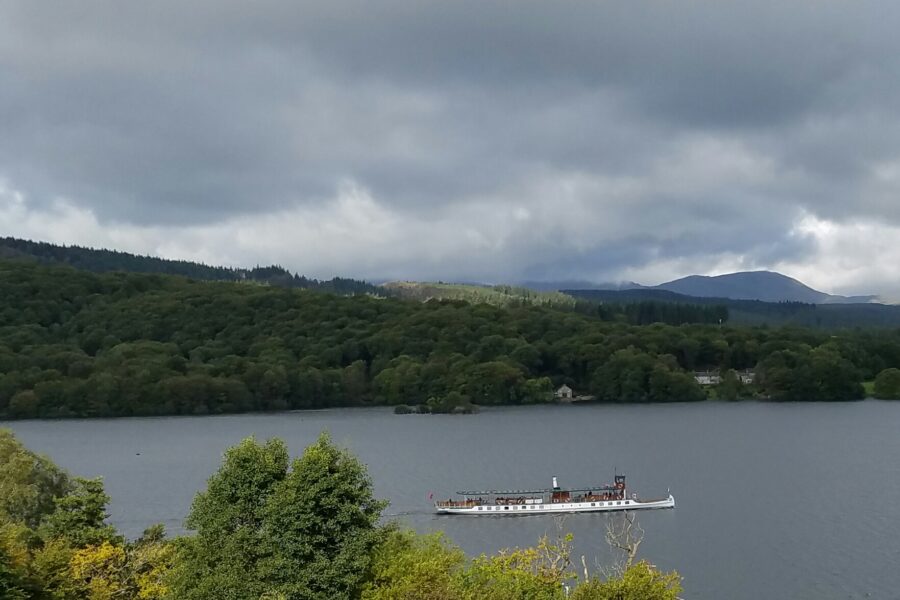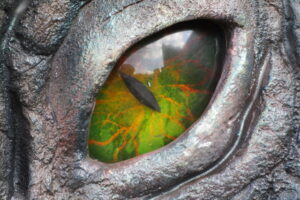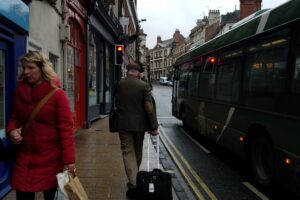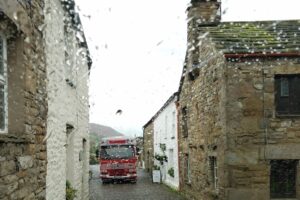“It’s not funny,” he says. I try to be sympathetic, but I laugh harder. I can’t help it.

Weather Bug is wrong again. Plans—foiled again. The forecast said weak sun with light fog at 8 a.m., lifting by nine, with clouds and sun throughout the morning and rain beginning in the early afternoon—a safe morning to drive north. The sun is less than weak—it isn’t there. Heavy gray clouds have turned to rain. I don’t hurry.
At ten the clouds part and blue skies are visible; there is activity everywhere on the estate. Making hay while the sun shines makes more and more sense. However, because we don’t trust Mother Nature or Weather Bug or English weather, we grab our raincoats and umbrellas before walking out the door, down the stairs, and along the flower-laden path. Proud of myself for remembering, I’m finally learning to go to the left side of the car; for days Michael and I have had to walk around each other to get where we currently belong. Old habits die hard. I understand that one too.
The Journey to The Beech Hill Hotel
A perfect day, we drive on a dual carriageway. The traffic is light. We have a destination. The Beech Hill Hotel. We have a reason—coffee, and sitting on the hotel balcony gazing at eleven-mile-long Lake Windermere. The fly in the proverbial ointment is that our GPS only seems to believe in cities or villages or towns as destinations. Not hotels. And, so far, in the Lake’s District, Google Maps has no 4G’s—no help. Michael programs the GPS for Grasmere a few miles beyond the northernmost part of the lake.
“It can’t be too hard to find,” I say, “according to the map the hotel is right on the road.”
The divided highway ends. The road narrows. The traffic increases. The sign ahead shows the current speed limit to be 40 mph—surely not. “That must be a mistake,” I say.

Michael lectures me about speed limits in England, “…70 mph on motorways and dual carriageways, 60 mph on single carriageways…and towns can set their own speed limits, for instance 50 mph limit on a stretch of road with sharp curves.” And I think we should be driving 10 mph, and stopping when a car approaches.
We see the hotel on the side of the road as we whiz past at the lightning speed of 30 mph. Oh well, I guess we will just do lunch in Grasmere, I think. But Michael has found a wide spot; he is turning in, backing out, turning around. Jeeves isn’t happy.
Beside the hotel once again we find there is no place to park head-in, and a delivery truck blocks access to the car park below. We inch along, discovering and pulling into a pay and display car park next door which gives individuals access to the Lakes District National Park system.
“It won’t take my money,” Michael says.
“What do you mean it won’t take your money?”
“It won’t take my money. See?”
“But there is a £60 fine for not paying.” And we’ll get caught—I know we’ll get caught. And I say pound sixty instead of sixty pounds and Michael laughs at my American interpretation of the English language.

We trudge up the hill to the hotel and coffee—but we are too late! The lobby and restaurant are empty. A lone receptionist sits behind a tall counter, ignoring us. We walk through the spacious room and out the door to the deserted terrace. Ian told us that his Mother ran this hotel for three years while he was in the Royal Navy. They called it home. Looking at Michael I tell him, “I could call this place home. It is glorious!”


Grasmere
It is almost eleven, and with no breakfast today our stomachs begin to rumble. Back in the car, we head toward Grasmere and lunch. Jeeves is pleased we are back on track. We traverse crowded narrow roads, trying to drive like the English, but not succeeding. I bite my lips and hold my breath—expletives slip from Michael’s.

Too late for breakfast and coffee, we are too early for lunch. Leaving our car in the parking lot of the Swan Hotel we cross the road and begin our walk into Grasmere. The road has no sidewalk. It has no shoulder. It has, maybe, about six-inches of pedestrian safety. We follow a young couple with backpacks, hugging the wall.


Nearing the town, sidewalks line our way and we accept their safety. Everything is green—green grass, green moss, green trees, green fells, green stone. I stop, trying to capture the essence of green. I’m not sure why, I hate to paint with green—it is almost impossible for me to get it right, but I love the real thing.


The town is filled with tourists, and they are dressed like tourists—maybe they are locals. I told Michael, no jeans, no tennis shoes. We need to dress like the English, but as far as I can tell, Michael is the most English looking person around.
“Why are all these people here?” he asks.
Well, I think, Wordsworth for one. And two. And three. And…
Sans tourists, the town is charming. Even with tourists, the town is charming. Real people live here. I want to be one of those people. Just for a while, not long. We explore, and touch and look till our stomachs remind us they do need to be fed.



The Swan Hotel

It is us and the bartender—no one else wants to eat. We are a lone foreign couple at a table for two seated in front of the window. Michael orders steak and ale pie with mash while I opt for smoked salmon—a very light lunch after yesterday. While waiting for our food—sipping on wine for me and beer for Michael—an English couple wanders in and then out to another room. Then another. And another. And another. We continue to sip.

Sitting here with our food before us, I think, Michael wins. I take my fork and reach over to his plate, swiping a big forkful of his mashed potatoes and gravy. The pie is next. Finally I settle in to the austerity of my smoked salmon and four lightly buttered wheat bread triangles. I blink and it is gone.


No Name Roads
“Where to next?” Michael asks, as we sit in our parked car.
“Well there is Wray Castle—but it’s not a real castle and I really don’t know how to get there, but there is Beatrix Potter’s farm.”
“Beatrix Potter?”
“Peter Rabbit—the books we used to read to Amanda?”
Michael programs Hawkshead into the GPS, and we begin to dodge traffic one more time. The roads are still curling winding slippery thin ribbons, but because they have tourist attractions, they have buses—coming toward us. Constantly. Michael has never sworn so much in so little time.

On our way to Hawksehead we pass a sign to Wray Castle. I tell Michael too late, but still he tries to find a place to turn around, and fails. Oh well, maybe on Thursday, when we’re on the boat. We pass by a sign that points the way to the Drunken Duck—it is on my pub list. “Ohhhhhh,” I breathe. Too late.
We drive through Hawkeshead. There is no Hill Top House. I check the brochure. It says Hawksehead. Near Sawrey.
“Keep going,” I say, “it is near Sawrey—there’s a sign to Sawrey.”
And we arrive to masses of people and buses and cars and no place to park and it really isn’t Sawrey, it is Near Sawrey and there is a sign to Far Sawrey and I sigh and Michael keeps going then tries again and turns around and still there is no room and he gives up and turns around again and Jeeves is going crazy. Michael reaches up and turns him off.

“So what,” he says, “it a house where a lady lived who wrote about rabbits. Who cares?”
And we continue on, thinking we are on our way home, till we aren’t and it is time to ask Jeeves for help again. Jeeves leads us down no name roads that are built for one. We pass by a beautiful old church that sits in the middle of a green, green field by itself—That is a place to explore, not a tourist in sight—but how in the world do you get there?
Michael makes a sharp hairpin turn and suddenly there is a hill above us and a road and I say, “I think that is where the church in the middle of the field is.”
“And that is a good place for it to be.” And he looks straight ahead. And drives. Hugging the left side of the road.

Jeeves keeps on leading us south on a road with no name, where no car can pass coming or going because cars are supposed to be carts. And we meet a man and his dog and we are between two rock walls and there is nowhere to go and everything is too close and every beep, every alarm, every sound the car has ever made is going off at once. Michael stops the car in frustration. Laughter bubbles up inside of me and spills from my lips.
“It’s not funny,” he says.
I try to be sympathetic, but I laugh harder. I can’t help it.









Leave a Reply
Your email is safe with us.